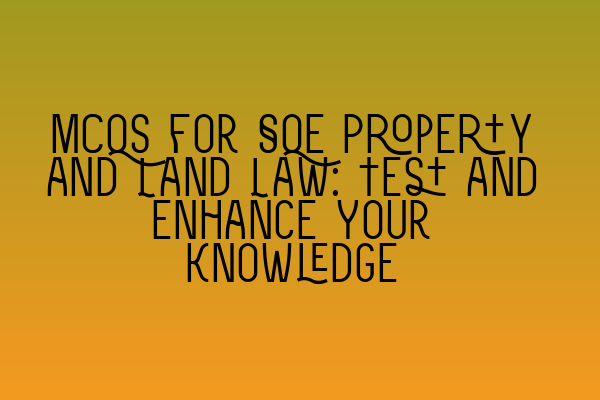MCQs for SQE Property and Land Law: Test and Enhance Your Knowledge
Welcome to SQE Property Law & Land Law, your trusted source for all things related to property and land law in the context of the Solicitors Qualifying Examination (SQE). In this blog post, we will be focusing on MCQs (Multiple Choice Questions) that will help test and enhance your knowledge in this area. Whether you are a law student preparing for the SQE or a practicing solicitor looking to refresh your memory, these MCQs will serve as a valuable tool.
Before we dive into the MCQs, let’s take a moment to understand their significance. Multiple Choice Questions are widely used in exams to assess a candidate’s understanding of a particular subject. They not only test your knowledge but also your ability to apply that knowledge to real-life scenarios. By practicing MCQs, you can familiarize yourself with the types of questions that may appear in the SQE, identify areas where you may need to further your understanding, and improve your overall exam performance.
Now, let’s explore some MCQs related to property and land law:
1. Which of the following is a legal estate recognized under English law?
a) Freehold estate
b) Leasehold estate
c) Equitable estate
d) All of the above
2. Which legislation governs the registration of land in England and Wales?
a) Land Registration Act 1925
b) Land Registration Act 2002
c) Landlord and Tenant Act 1954
d) Trusts of Land and Appointment of Trustees Act 1996
3. What is the purpose of a restrictive covenant?
a) To limit the use or development of land
b) To grant an easement over land
c) To create a legal charge on land
d) To extinguish an existing lease
4. True or False: Legal title to registered land can be acquired through adverse possession.
5. Which of the following is an overriding interest under the Land Registration Act 2002?
a) Legal mortgage
b) Easement
c) Unregistered lease
d) Equitable charge
These are just a few examples of the type of MCQs you may encounter in the SQE. By practicing them, you can become more comfortable with the format and content of the exam, increasing your chances of success.
To further enhance your understanding of property and land law, we recommend checking out our related articles:
– Ethics in Contract Law: Navigating the Moral and Legal Dimensions
– Misrepresentation in Contracts: Unveiling Deceptive Practices
– A Closer Look at SQE Contract Law Syllabus
– SQE Contract Law: Analyzing Landmark Cases and Influential Judicial Decisions
– Contract Law for Services: Key Considerations and Best Practices
These articles cover various aspects of contract law that are relevant to property and land law. They will provide you with valuable insights, case studies, and practical tips to enhance your overall understanding of the subject.
In conclusion, MCQs are an effective tool for testing and enhancing your knowledge in property and land law. By incorporating them into your study routine and referring to our related articles, you can better prepare yourself for the SQE and excel in this area of legal practice. Keep practicing, stay informed, and you’ll be well on your way to success.
We hope you found this blog post informative and helpful. For more resources and guidance on property and land law in the context of the SQE, feel free to explore our website and reach out to our team of experts. Good luck with your studies and exam preparations!
Note: This blog post is for informational purposes only and should not be considered as legal advice. Always consult with a qualified solicitor for specific legal inquiries and guidance.
